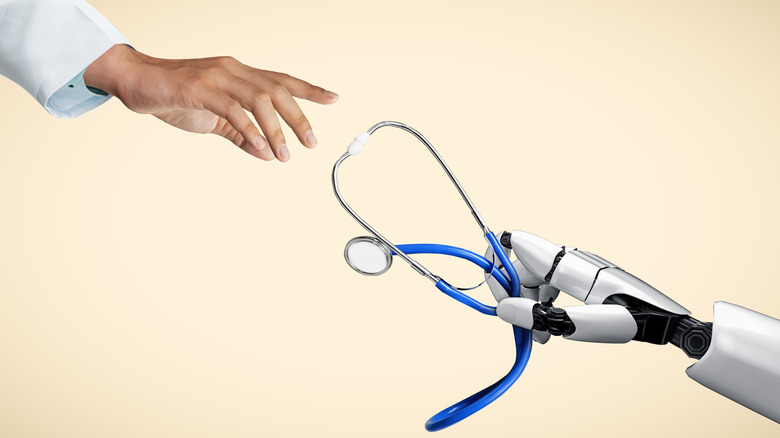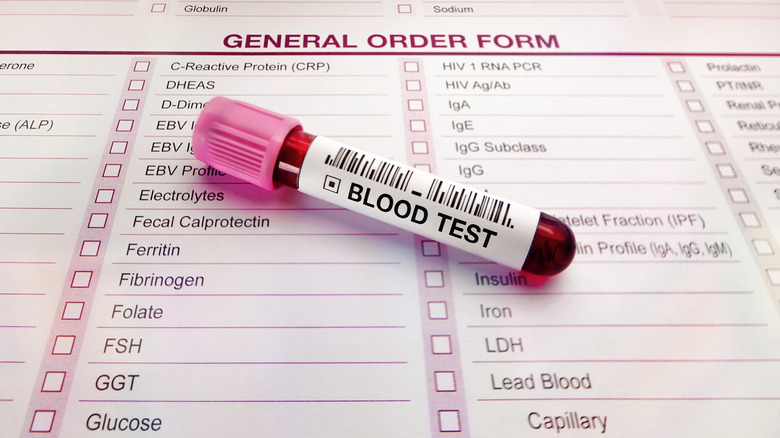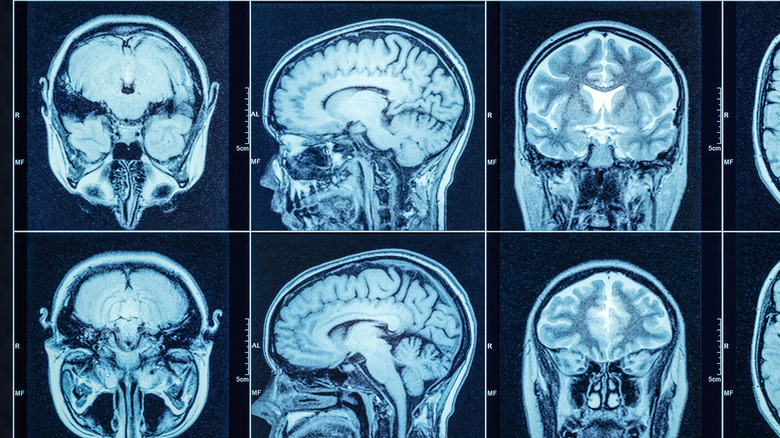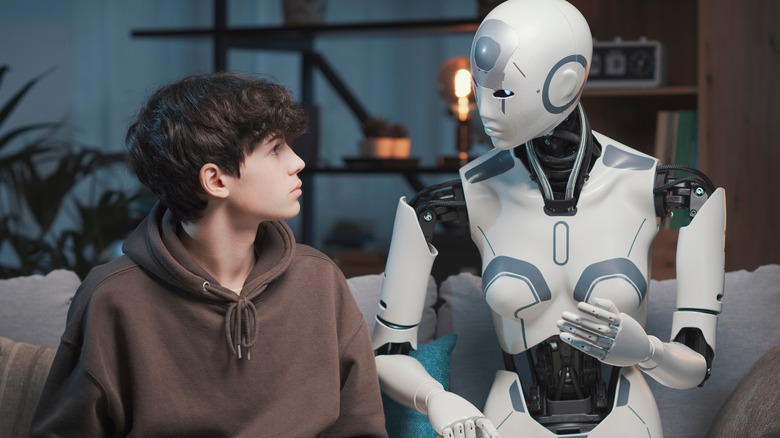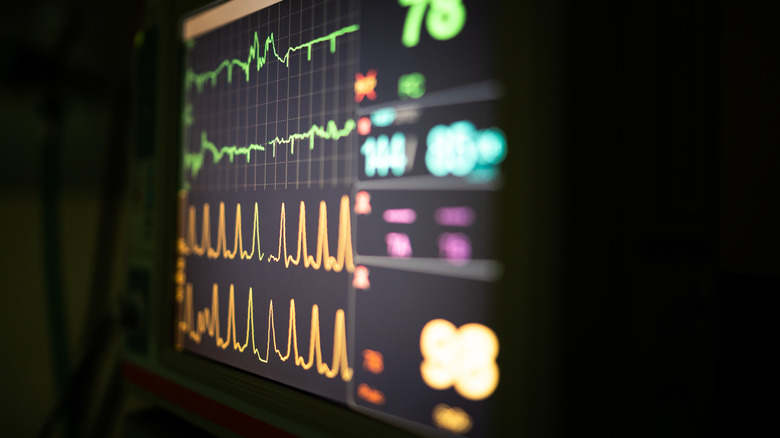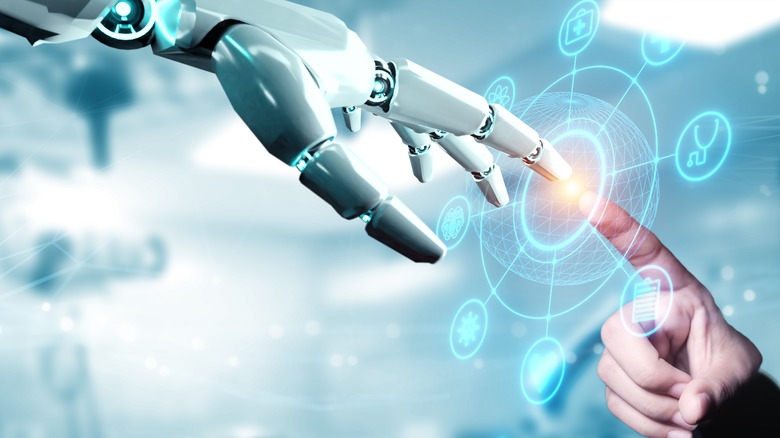10 Ways AI Is About To Replace Your Doctor
From customer service workers, to lawyers, to the kind of people who write articles like this — it seems that almost everyone has had their job threatened in some way by the increasingly powerful artificial intelligence programs that are being developed. Now, it seems even doctors aren't safe from the AI revolution. ChatGPT, one of the more famous AI programs currently available to the public, has managed to pass a U.S. Medical Licensing Exam. Dr. Scott Gottlieb, a regular contributor to CNBC, thinks that AI could take on some of your doctor's jobs much sooner than you might expect.
AI is great at spotting subtle signs in a set of data. It can also scrape large data banks and highlight common themes. In fact, that's how things like large language model AI work. It takes a large data set and works out a response to prompts based on an average drawn from said set. This kind of design is also very useful in the medical field. Couple it with the fact AI never tires and can perform tasks far quicker than humans and you have a potentially game-changing medical innovation.
Here are 10 of the areas where we could see AI make an impact in the medical field. Of course, it is worth noting that — as advanced as AI is — you should always seek a second opinion from a qualified human medical professional.
Using AI for minor ailments could help everyone
Globally, medical systems are quite strained. Patient-facing positions — doctors, physician's assistants, and nurses — require highly skilled and highly qualified individuals. Only around 0.29% of Americans are doctors, which means there are over 300 people per doctor if you break it down in a basic sense. Factor in things like how the population is distributed, the number of those doctors who are specialists, and the ratio gets even worse.
All of this means that a doctor's time is valuable. Patients with more minor ailments are likely to get an appointment with a lower-ranking medical professional, but these openings are also limited which is why many countries run campaigns encouraging people to treat minor diseases at home.
AI could be beneficial in this regard, as it allows people to get a second opinion on their symptoms without taking up the time of anyone in the doctor's office. An LLM AI is capable of asking questions to further clarify things with a patient. If the patient presents with something minor, like a cold, the AI can provide self-care advice, which will allow the patient to recover at home. It is also capable of flagging more worrying symptoms and sending the patient to an actual doctor if needed.
AI can help patients understand their test results
Test results, such as blood analysis, can be complex. If you haven't got a medical background, you have little chance of deciphering the results, let alone piecing together what they mean for you. Your doctor — or someone else at the practice — is supposed to talk you through any results they receive and answer any questions they may have. However, there is a chance that you'll feel that the doctor hasn't explained things well enough and want to ask further questions about a particular part of the result.
At the time of this article's publication, you can upload the results of medical tests, including bloodwork, to ChatGPT and have the model analyze your results. GPT-4, which comes with the paid version of ChatGPT, does a better job than 3.5, the standard model OpenAI offers. At its best, the AI can explain each part of your test results and use the data along with any symptoms to suggest potential conditions. It can even help out if your furry friends are having medical issues.
Once again, however, all of this should be double-checked with a medical professional.
It can help diagnose cancer early
One of the ways AI could make a huge difference is with cancer screening. Despite the artificial intelligence boom seeming like recent news, AI's ability to improve cancer detection rates is something doctors and scientists have known about for a while now. A model built by Google managed to produce significantly fewer false negatives and positives than human-only screening, and that was several years ago. AI has several advantages over humans when it comes to this kind of screening, as it can be programmed to be particularly good at spotting patterns. Beyond that, AI doesn't get tired – unlike an overworked human radiologist.
A Harvard study suggests that AI models may be particularly good at screening at-risk groups for things like pancreatic cancer. This alone could make a huge difference and save a significant number of lives. Pancreatic cancer is particularly problematic for a couple of reasons. First, early detection plays a significant role in successful cancer treatment, and in most cases, pancreatic cancer doesn't present any easily noticeable symptoms until it has advanced, and some pancreatic cancers can be very aggressive, again making early detection vital.
A finely tuned AI tool might turn a cancer that has long been a death sentence to many who developed it into something with a significantly improved survival rate.
AI can spot what doctors miss
Sometimes a small, seemingly insignificant detail can make all of the difference in the medical world. Unfortunately, the human body has its limitations, and the human eye often misses things — especially when the person it is attached to is under pressure.
AI models can thoroughly screen things like X Rays and mammograms while doing so far more quickly than a radiologist can. Just in the chest alone, this can lead to better screening of cancers, bacterial infections like tuberculosis, pneumonia, air in the chest cavity, fractures, and much more.
In addition to increased accuracy, this kind of burden being lifted off of doctors has other benefits. It will significantly cut down the amount of time a radiologist spends screening each patient, which means they can focus that saved effort elsewhere. This could mean specialists get more time to spend with each patient, explaining results, gathering information, and providing better all-around care. In strained and understaffed health care systems, doctors and specialists could take on and treat more patients thanks to the efficiency savings this kind of AI screening offers.
AI may make mental health services more accessible
Mental health care presents a serious and growing global crisis, and poor access to mental health treatment is exacerbating this crisis during times of increased stress.
The main barriers to access are affordability and staffing. There aren't enough mental health professionals to go around, and those that are available can be very expensive. As a result, AI could make a massive difference in mental health treatment. Several companies are already offering AI therapy alongside their other services. It is worth noting that patients are encouraged to talk to a qualified human if they are in crisis, and many companies that use AI models will ensure a therapist is flagged if the issue at hand is more than the bot can handle.
However, if a patient just needs to vent, or work through some basic things, then AI could be an affordable way to do that. Bots like ChatGPT are successful due to their ability to mimic human interaction, which may allow people to open up to them. AI bots can be on call 24/7, can take on a very large number of patients, and cost far less to run than highly qualified humans.
Beyond that, AI could be key to tackling the loneliness crisis outlined by the U.S. Surgeon General that is affecting a growing number of people in an increasingly isolated society, as AI bots can offer surprisingly deep levels of companionship. In fact, a significant number of people who use the popular chatbot service Replika believe the bot they chat to is in some way sentient.
AI can monitor patients 24/7
Even in intensive care, doctors and nurses cannot closely monitor a patient every second of every day. Instead, regular checkups are performed, and the patient is hooked up to a variety of devices that will hopefully sound the alarm if an issue occurs in the meantime. However, with AI, constant close monitoring may be possible — and can even be done outside of an intensive care unit.
In Britain, the NHS has introduced Virtual Wards, a system that allows patients to receive hospital-level care in their own homes. AI helps monitor patients while they are being cared for outside of a hospital environment and flags potential issues with medical staff. Obviously, response times are far greater than they would be inside a hospital, so AI input seems vital to making such systems safe and workable. AI is good at spotting patterns and can draw parallels based on the data it has been trained on. It could be given information about the patient's condition and look out for any early danger signs.
There is nothing to stop an AI program from monitoring a patient constantly, as a piece of code doesn't get tired or hungry and — if enough bandwidth is there — it could even monitor an entire ward or hospital simultaneously.
AI can spot an issue you don't even know you have
Diagnosing rare diseases is often a long, expensive, and difficult process. Some patients have to wait up to seven years before finding out what particular ailment they have, according to the National Gaucher Foundation. It's also unsuccessful a lot of the time, with close to 40% of patients being misdiagnosed at some point in the process. Luckily, it seems AI can be used to streamline the diagnosis and treatment of rare diseases.
A rare disease diagnosis is the process of a deduction made by a medical professional based on things like a patient's symptoms, test results, family history, and various other factors. It just so happens that AI is good at gathering large amounts of data and using it to reach a conclusion. One such bot being developed by ThinkGenetic can screen patients based on their symptoms and test results before suggesting potential diseases based on the input.
Others can analyze scans and X-rays, spotting anomalies that specialists may have overlooked. If used properly, this could result in a far faster, cheaper, and more accurate diagnosis than other methods currently in use.
AI could improve sexual health treatment
AI could improve sexual health treatment in a number of ways. While it may help with things like diagnosis and treatment options, its main benefit is quite surprising. An AI program is ideal for sexual health treatment because, underneath it all, it's a cold, unfeeling machine.
Despite efforts to remove the stigma surrounding sexual health treatment it still persists. Due to this, many people avoid going to a medical professional for treatment, screening, testing, or just general advice. This is a huge problem, and things like unplanned pregnancy, STD rates, and many other issues could drastically decline if people were more willing and able to access treatment. This is where AI comes in.
While people may feel embarrassed to chat with a doctor, PA, or nurse, they might still be comfortable chatting with a bot. The bot is more than capable of providing advice, access to resources, and treatment options, which should, in turn, see an improvement in sexual health across the board. Beyond patient-facing care, AI can be used to improve sexual health outcomes in other ways. It is capable of driving medical research forward and is currently being used to develop more effective treatments for diseases like HIV.
Less paperwork
While the spotlight may be on patient treatment, the medical industry involves more than just looking at symptoms and providing a diagnosis. There's an awful lot of paperwork involved in keeping the system running.
According to the New England Journal of Medicine, medical staff are spending an ever-increasing amount of time filling out more and more complex paperwork. This is time that could be spent treating patients or performing other beneficial tasks. Overworked staff are also prone to mistakes. Mistakes on patient paperwork could impair treatment or lead to a dangerous mixup, while mistakes on insurance paperwork could see a claim or treatment denied.
AI can help out here in a couple of ways. At worst, it can streamline the process — simplifying it for the task member filling out the paperwork. This should make things significantly quicker and lead to fewer errors. An advanced enough AI could take some rough information provided by someone like a doctor and use said information to fill out any necessary paperwork on its own. As mentioned, less paperwork means medical staff will have more time to spend with their patients. So while you may not directly notice AI's involvement here, you may be able to spot the benefits of practices bringing bots on board.
AI could be keeping an eye on your prescriptions
AI programs are powerful tools and useful overseers. If an AI model is given set parameters, it can be used to spot potential mistakes and automate certain processes. This is very useful in pharmacies, where an error could lead to a patient being given incorrect doses of vital medication or the wrong drug entirely. Such errors are rare, but the inclusion of AI could cut them down even further. Pharmacists and doctors could also use AI's capabilities to further tailor things like drugs and dosages to a patient's specific needs. As AI is good at spotting patterns, it may also work well at flagging suspicious behaviors.
One case study published in Frontiers involving an AI-powered online pharmacy in China showed some promising results but also highlighted the need for human oversight. There were issues with just over 16% of the prescriptions issued by the AI, and of those "49% were accepted and modified by physicians proactively and 51.00% were passed after pharmacists intervened."
However, it ultimately concluded that "the AI-based internet hospital pharmacy service ensures safe and rational drug use, saves patients' time and economic costs." As AI develops further, accuracy will improve, making this kind of pharmacy model even more safe and practical.
